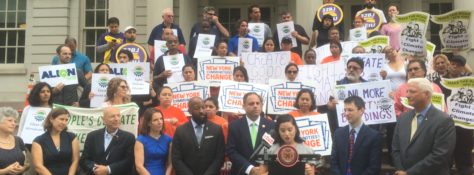News
A process called holistic grazing can help combat global warming by pulling carbon out of the atmosphere into “sinks,” or giant carbon repositories. Farmers that use holistic grazing practices move grazing animals from one place to another for limited periods of time.
Learn MoreNews
In New York, Harmful Algal Blooms are rising at an alarming rate. One cause of HABs is agricultural runoff, which occurs when chemicals from fertilizer end up in our waterways. Some houses in rural New York neighborhood leach nitrogen into waterways because they are not connected to a public sewer system. Another cause of HABs is climate change.
Learn MoreNews
The impacts of Florence were and continue to be deadly. As hurricanes become more severe and more frequent, scientists have been able to better predict just how much of a role climate change has played in the intensity of these storms.
Learn MoreNews
Governor Cuomo and DEC announced that the settlement funds will be invested in clean transportation including earmarking 40% for buses - a successful step forward in our Clean Buses for Healthy Niños advocacy campaign. DEC will prioritize these emissions reduction projects in environmental justice communities that have traditionally been overburdened by pollution, which leads to higher rates of asthma and other respiratory illnesses.
Learn MoreNews
New York State Attorney General Barbara Underwood is taking steps to preserve the Obama-era Clean Power Plan, which would have reduced greenhouse gas emissions by nearly 30% nationwide.
Learn MoreNews
A recent study by Data Driven Yale shows that sub-national efforts have the potential to reduce global greenhouse gas emissions and represent a significant step forward in meeting the global temperature goals of the Paris Agreement. However, they are still not enough to prevent the dangerous warming that will trigger increased heat waves, mightier storms, rising seas and displacement of people.
Learn MoreNews
A coalition of over 40 environmental, governmental, housing, labor, and real estate groups recently unveiled the Blueprint For Efficiency plan to mandate dramatic energy use cuts in New York City’s large buildings. In conjunction with the plans release, City Council Member Costa Constantinides announced plans to introduce legislation this fall that would reflect much of the plan’s recommendations. The plan and accompanying legislation come after two years of discussions and negotiations between the city administration, City Council, and stakeholder groups on how to address the biggest contributor to the city’s greenhouse gas emissions - buildings.
Learn MoreNews
It is crucial for policymakers to pass legislation to divert food waste from landfills, as only 3% of waste produced in the state does not end up at either a landfill or waste-to-energy facility. The Food Recovery and Recycling Act (that, unfortunately, did not pass) would have discouraged the production, distribution, and preparation of excess food; recovered excess food to be redistributed to those in need; and provided funding for new recycling programs specifically concerning food scraps.
Learn More


